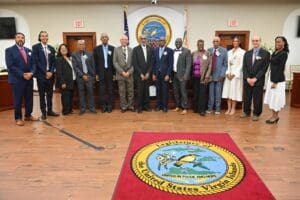
Elected members of the Sixth Constitutional Convention joined in a day-long plenary session on Saturday. It was the second session since the group formally convened in late January.
The latest attempt to replace the act created by Congress with the Virgin Islands’ own constitution takes place 60 years after the first constitutional convention began in 1964. Under the direction of convention President Usie Raymond Richards, three working groups reviewed sections of the draft created by the fifth convention in 2009.
After each team presented their analysis, convention members voted to adopt three standing committees to reshape the 19 articles that made up the previous document. Converting the working groups into standing committees was a formal step towards completing a finalized constitution by October.
Passage of the measure came with modifications proposed by convention Secretary Imani Daniel to move two provisions from Standing Committee No. 3 addressing Human Rights to Standing Committee No. 1 — Finance and Public Service.
A fourth standing committee also won a favorable vote. That group would craft language on cultural heritage.
The 19 articles include: Bill of Rights; Principles of Government; Definition of Virgin Islander; three separate articles pertaining to the Legislative branch, the Judiciary, and local government; Suffrage and Elections; Education; Public Finance; an article spelling out the Power to Tax; Taxation, Finance, and Commerce; Economic Development; Public Health, Safety and Welfare; Culture, Environmental Protection; General Provisions; a Political Status Advisory Commission; Amendments, and Transition.
The last article — transition — was established to help the existing V.I. government makes whatever changes the finalized and approved constitution calls for, Daniel said.
Richards, along with working committee leaders Rupert Ross, John Canegeta and Rudel Hodge, Jr., guided Saturday’s discussions. They asked delegates to remember the difference between constitutional language and the types of language found in bills formed by lawmakers.
“The more you put into constitutional language, the more your hands are tied in terms of flexibility,” said delegate David Silverman.
Ross and Richards assured the group that spelling out the definition of a Virgin Islander had not met with Congressional objections on the last attempt. “My interpretation — given the Department of Justice review — did not address the definition of who is a Virgin Islander. Their concern is how the definition is applied,” Richards said.
Delegates to the Constitutional Convention are scheduled to meet again as a body on April 5.





